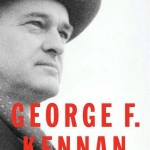October, 1961: Checkpoint Charlie: one of those barely remembered confrontations in the early days of the Cold War.
A few months before, the Soviets, against allied protests, had built the Berlin Wall, effectively sealing off East Berlin from the rest of the world. Western diplomats were refused free access to the area, against earlier agreements that they would be allowed such access.
The confrontation escalated when Americans moved tanks to the border to support the accord. The Soviets responded with tanks of their own on their side. Would someone begin firing, triggering World War III?
Fortunately, neither U.S. President John F. Kennedy nor Soviet leader Nikita Khrushchev wished to begin a war. Back channel negotiations were established. Eventually both sides began backing away their tanks. Diplomats on both sides continued to have access to the entire city.
Before these events, before the Wall was even in place, in the mid 1950’s, John Kerry was a school boy in Berlin with his father, a U.S. official there. Kerry, who would later become U.S. Secretary of State, likes to tell of the time he biked over into East Berlin, apparently using his American passport, to explore the area. His father was horrified when he discovered what his son had done and promptly grounded him. Apparently, he had visions of his son’s escapade causing an international incident.
Now, more than six decades later, the world is still subject to crises along that longer divide between east and west.



